2024年中考英语二轮复习课件(共31张PPT) 专题九 时态和语态
文档属性
| 名称 | 2024年中考英语二轮复习课件(共31张PPT) 专题九 时态和语态 |

|
|
| 格式 | pptx | ||
| 文件大小 | 164.6KB | ||
| 资源类型 | 教案 | ||
| 版本资源 | 通用版 | ||
| 科目 | 英语 | ||
| 更新时间 | 2024-02-28 00:00:00 | ||
图片预览


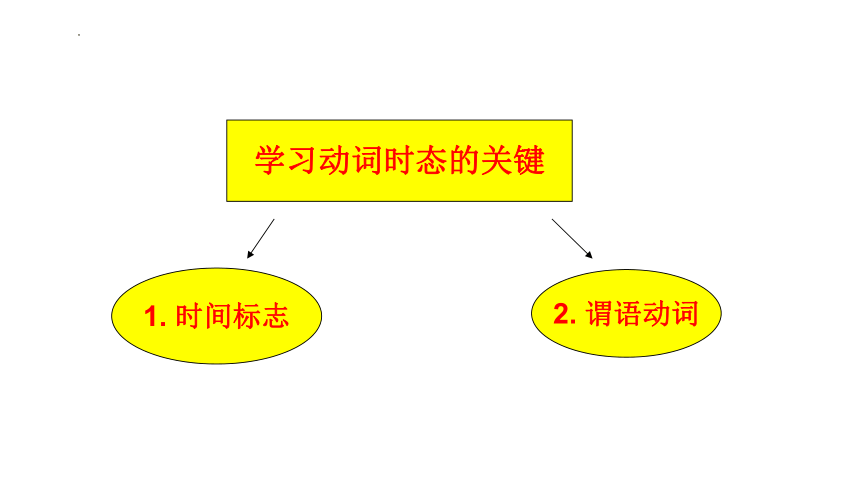
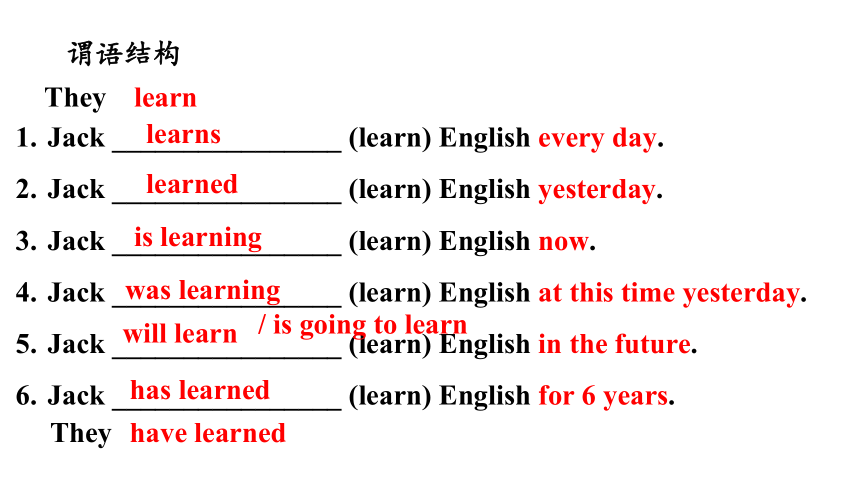
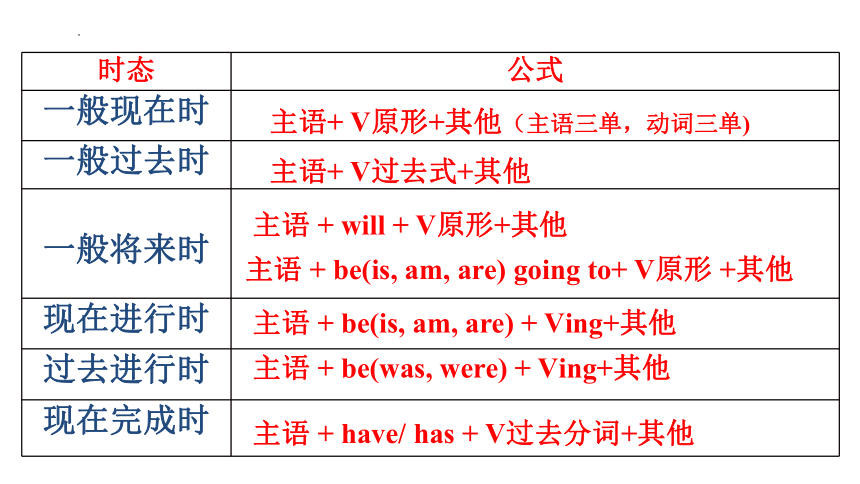
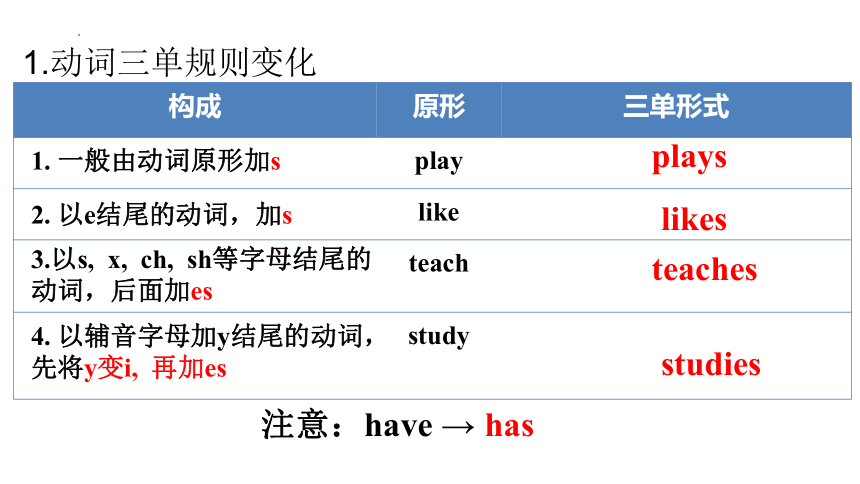
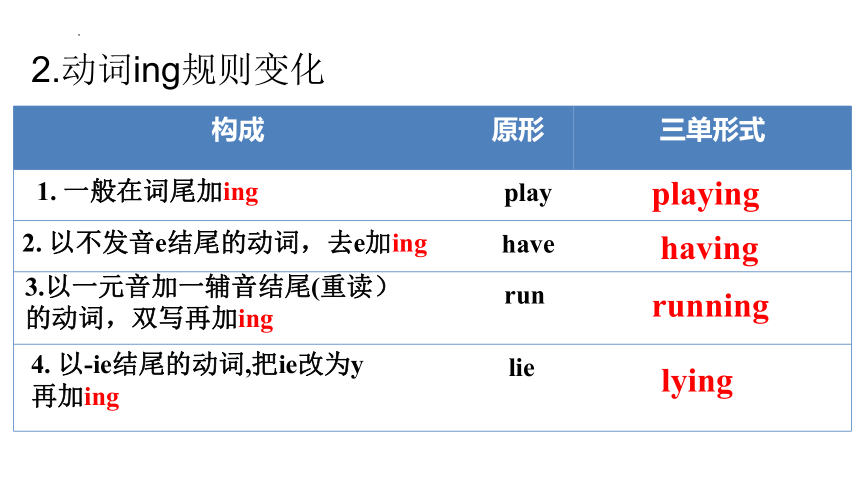
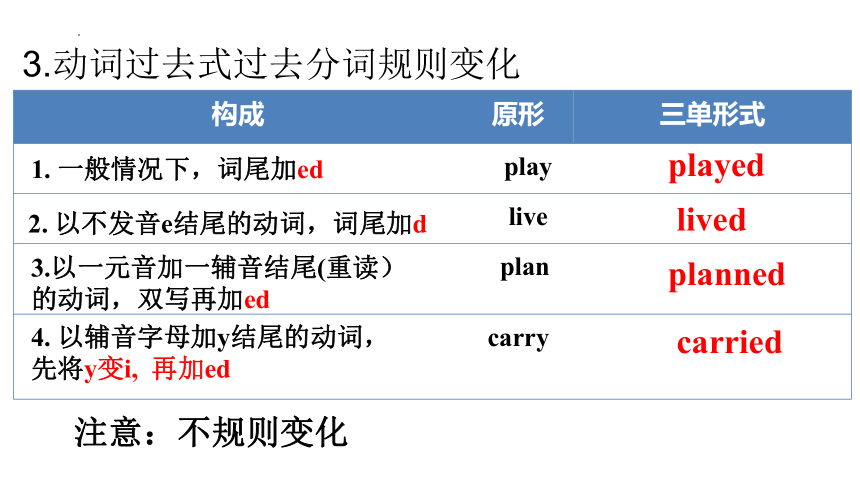
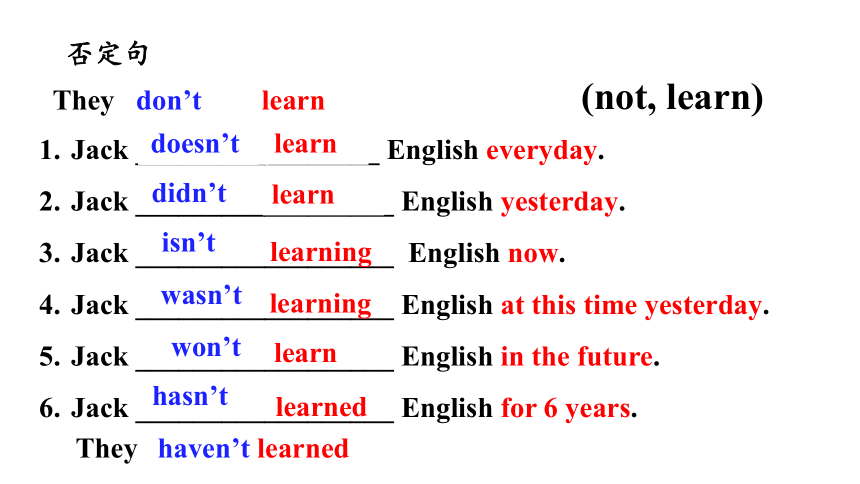
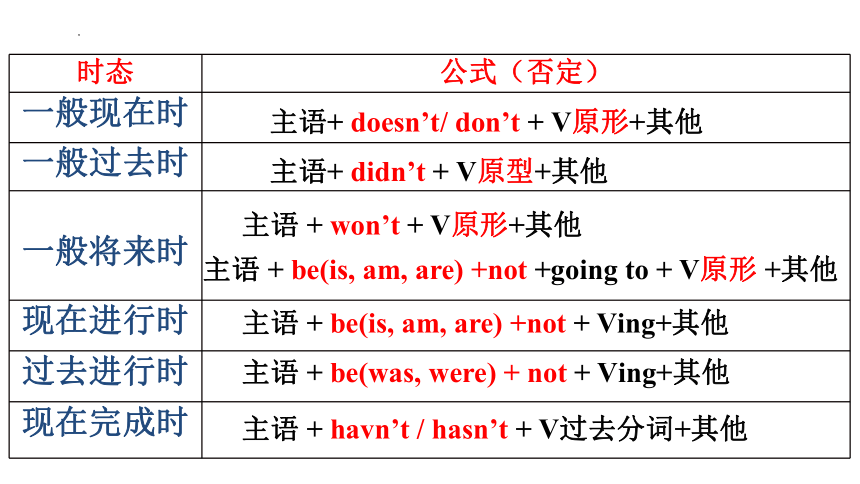
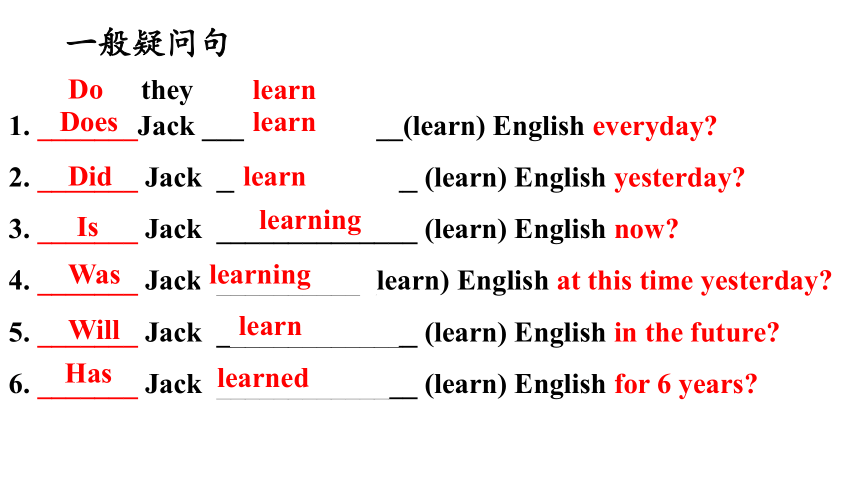
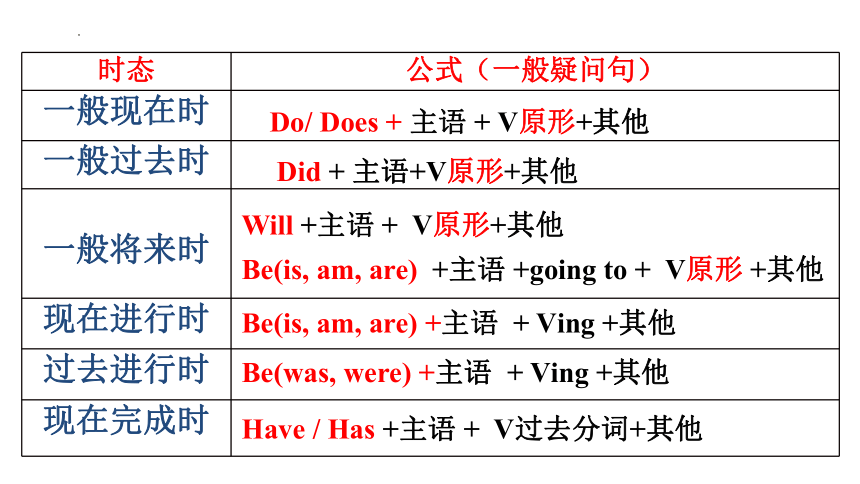
文档简介
(共31张PPT)
中考复习
专题九
时态和语态
时态
学习动词时态的关键
1. 时间标志
2. 谓语动词
Jack ________________ (learn) English every day.
Jack ________________ (learn) English yesterday.
Jack ________________ (learn) English now.
Jack ________________ (learn) English at this time yesterday.
Jack ________________ (learn) English in the future.
Jack ________________ (learn) English for 6 years.
learns
learned
is learning
was learning
will learn
has learned
谓语结构
They
learn
/ is going to learn
They
have learned
时态 公式
一般现在时
一般过去时
一般将来时
现在进行时
过去进行时
现在完成时
主语+ V原形+其他(主语三单,动词三单)
主语+ V过去式+其他
主语 + will + V原形+其他
主语 + be(is, am, are) going to+ V原形 +其他
主语 + be(is, am, are) + Ving+其他
主语 + be(was, were) + Ving+其他
主语 + have/ has + V过去分词+其他
1.动词三单规则变化
构成 原形 三单形式
play
like
teach
study
plays
1. 一般由动词原形加s
likes
2. 以e结尾的动词,加s
teaches
3.以s, x, ch, sh等字母结尾的
动词,后面加es
studies
4. 以辅音字母加y结尾的动词,先将y变i, 再加es
注意:have → has
2.动词ing规则变化
构成 原形 三单形式
play
have
run
lie
playing
1. 一般在词尾加ing
having
2. 以不发音e结尾的动词,去e加ing
running
3.以一元音加一辅音结尾(重读)
的动词,双写再加ing
lying
4. 以-ie结尾的动词,把ie改为y再加ing
3.动词过去式过去分词规则变化
构成 原形 三单形式
play
live
plan
carry
played
1. 一般情况下,词尾加ed
lived
2. 以不发音e结尾的动词,词尾加d
planned
3.以一元音加一辅音结尾(重读)
的动词,双写再加ed
carried
4. 以辅音字母加y结尾的动词,先将y变i, 再加ed
注意:不规则变化
Jack _________________ English everyday.
Jack __________________ English yesterday.
Jack __________________ English now.
Jack __________________ English at this time yesterday.
Jack __________________ English in the future.
Jack __________________ English for 6 years.
learns
learned
is
was
will
has
learning
learning
learn
learned
isn’t
wasn’t
won’t
hasn’t
does
did
doesn’t
didn’t
否定句
(not, learn)
They
haven’t learned
They
do
don’t
learn
learn
learn
时态 公式(否定)
一般现在时
一般过去时
一般将来时
现在进行时
过去进行时
现在完成时
主语+ doesn’t/ don’t + V原形+其他
主语+ didn’t + V原型+其他
主语 + won’t + V原形+其他
主语 + be(is, am, are) +not +going to + V原形 +其他
主语 + be(is, am, are) +not + Ving+其他
主语 + be(was, were) + not + Ving+其他
主语 + havn’t / hasn’t + V过去分词+其他
一般疑问句
1. _______Jack ______________(learn) English everyday
2. _______ Jack ______________ (learn) English yesterday
3. _______ Jack ______________ (learn) English now
4. _______ Jack __________ (learn) English at this time yesterday
5. _______ Jack ______________ (learn) English in the future
6. _______ Jack ______________ (learn) English for 6 years
learns
learned
is learning
was learning
will learn
has learned
Is
learning
Was
Will
Has
learn
learning
learned
Does
Did
Do
they
learn
learn
learn
时态 公式(一般疑问句)
一般现在时
一般过去时
一般将来时
现在进行时
过去进行时
现在完成时
Do/ Does + 主语 + V原形+其他
Did + 主语+V原形+其他
Will +主语 + V原形+其他
Be(is, am, are) +主语 +going to + V原形 +其他
Be(is, am, are) +主语 + Ving +其他
Be(was, were) +主语 + Ving +其他
Have / Has +主语 + V过去分词+其他
时间标志词
always often usually sometimes never
once a week
every year…
一般现在时
一般过去时
一般将来时
yesterday...
last...
...ago
in+过去年份
just now
will do/ be going to do
next...
tomorrow...
in+一段时间…
时间标志词
Look
Listen
now
at the moment…
already yet
never ever
since for
just…
现在进行时
过去进行时
现在完成时
at 8:00 yesterday…
1. I ______ to school on foot yesterday.
A. go B. went C. am going
2. —Have you written your book report, Bill
—No, not yet. I ______ it in two days.
A. finish B. will finish C. finished
3. —Jenny, your new tape player looks great.
—Oh, it’s not new. I ______ it for three years.
A. bought B. have bought C. have had
4. —I went to your office at 9:00 yesterday morning, but you were not in.
—Sorry, I ____with the manager in the meeting room at that time.
A. was talking B. am talking C. were talking
练习
B
B
C
A
5. —Tom, what’s your dad doing
—He ______ my bike.
A. repair B. repairs C. is repairing
6. Every year thousands of tourists ______ the mountain area to relax themselves.
A. visited B. visit C. have visited
7. —Sorry, Tom. I can’t find the book you ______ me.
—Never mind. I don’t need it any more.
A. lent B. will lend C. has lent
8. —How did the accident happen
—The girl ______ WeChat(微信) while walking across the street.
A. reads B. is reading C. was reading
C
B
A
C
语态
主语是谓语动作的执行者。
主动语态:
被动语态:
主语是谓语动作的承受者。
“by被...”
构成:
be+过去分词
主动语态变被动语态的方法
is cleaned
We clean the classroom every day.
被动语态
主
The classroom
every day.
by us
主动语态
宾
谓
the classroom
宾语变主语
be+过去分词形式
(by+宾格)
We plant a lot of trees every year.
every year.
A lot of trees
are planted
by us
→
Our city built a new school last year.
last year.
A new school
was built
by our city
→
2. The classroom is cleaned every day.
4. Our school was built in 1998.
5. The sports meeting will be held tomorrow.
6. We will have a speaking competion tomorrow.
1. We read English every day.
3. I broke my bike yesterday.
am/is/are+过去分词
was/were+过去分词
will+be+过去分词
辨别出被动语态的句子
√
√
√
×
×
×
一般现在时:
一般过去时:
一般将来时:
含有情态动词的被动语态:
am/is/are+过去分词
was/were+过去分词
will / be going to +be+过去分词
情态动词+be+过去分词
小结:中考常考的各种被动语态
过去分词的变化规则
2. 不规则
背
(1) 一般情况下,动词词尾加 ed 。
(2) 以不发音的 e 结尾动词,动词词尾加 d。
(3) 以辅音字母 + y结尾的动词,把y变为i 再加ed。
(4) 以一个辅音字母结尾的重读闭音节动词, 双写词
尾辅音字母,再加 ed。
四种规则变化:
1. 规则
不规则变化
see
— saw — seen
do
— did — done
take
— took — taken
go
— went — gone
eat
— ate — eaten
write
— wrote — written
make
— made — made
build
— built — built
buy
— bought — bought
teach
— taught — taught
( )①With the development of China, Chinese______by
a large number of people in the world.
A. speaks B. speak C. is spoken
C
( )②—Please come back earlier, honey!
—I’m not a child! I should _____ what to do!
A. be told B. not be told C. tell
B
( )③Last year, five Chinese teachers ______to a school
in the UK to teach the British students in Chinese
style for four weeks.
A. was sent B. were sent C. sent
B
( )④A new road ______near my school next year.
A. is built B. will build C. will be built
C
感官动词see/hear/watch/feel等和使役动词make/let/have 等后跟省略to的动词不定式, 变为被动语态时应加上不定式符号to。
特殊形式的被动语态
1. We saw an alien _______ (get) out of the UFO.
2. An alien was seen _________ (get) out of the UFO.
get
to get
see sb
do sth
doing sth
sb be seen
to do sth
doing sth
小结一:
(2)有些动词, 如sell, cut, drive, wash, clean, write, open, lock等, 作为不及物动词时可以用主动语态表示被动含义。。
The dishes ________(smell) so delicious.
Books of Harry Potter ________(sell) well.
小结二:
(1) feel, look, sound, smell, taste等系动词的
主动语态表示被动含义。
smell
sell
( )① A year has four seasons and it ____ twelve months.
A. divided into B. is dividing into
C. is divided into
C
( )②—The meeting ____ because of the fog in Northern
China last week.
—Oh, it’s too bad! We should take action to improve
the air quality.
A. put out B. was put out
C. was put off
C
( )③The book is worth______.
A. read B. reading
C. to read
( )④The apples______ nice.
A. look B. looks
C. is looked
B
A
主动语态表示被动含义
Thank you
中考复习
专题九
时态和语态
时态
学习动词时态的关键
1. 时间标志
2. 谓语动词
Jack ________________ (learn) English every day.
Jack ________________ (learn) English yesterday.
Jack ________________ (learn) English now.
Jack ________________ (learn) English at this time yesterday.
Jack ________________ (learn) English in the future.
Jack ________________ (learn) English for 6 years.
learns
learned
is learning
was learning
will learn
has learned
谓语结构
They
learn
/ is going to learn
They
have learned
时态 公式
一般现在时
一般过去时
一般将来时
现在进行时
过去进行时
现在完成时
主语+ V原形+其他(主语三单,动词三单)
主语+ V过去式+其他
主语 + will + V原形+其他
主语 + be(is, am, are) going to+ V原形 +其他
主语 + be(is, am, are) + Ving+其他
主语 + be(was, were) + Ving+其他
主语 + have/ has + V过去分词+其他
1.动词三单规则变化
构成 原形 三单形式
play
like
teach
study
plays
1. 一般由动词原形加s
likes
2. 以e结尾的动词,加s
teaches
3.以s, x, ch, sh等字母结尾的
动词,后面加es
studies
4. 以辅音字母加y结尾的动词,先将y变i, 再加es
注意:have → has
2.动词ing规则变化
构成 原形 三单形式
play
have
run
lie
playing
1. 一般在词尾加ing
having
2. 以不发音e结尾的动词,去e加ing
running
3.以一元音加一辅音结尾(重读)
的动词,双写再加ing
lying
4. 以-ie结尾的动词,把ie改为y再加ing
3.动词过去式过去分词规则变化
构成 原形 三单形式
play
live
plan
carry
played
1. 一般情况下,词尾加ed
lived
2. 以不发音e结尾的动词,词尾加d
planned
3.以一元音加一辅音结尾(重读)
的动词,双写再加ed
carried
4. 以辅音字母加y结尾的动词,先将y变i, 再加ed
注意:不规则变化
Jack _________________ English everyday.
Jack __________________ English yesterday.
Jack __________________ English now.
Jack __________________ English at this time yesterday.
Jack __________________ English in the future.
Jack __________________ English for 6 years.
learns
learned
is
was
will
has
learning
learning
learn
learned
isn’t
wasn’t
won’t
hasn’t
does
did
doesn’t
didn’t
否定句
(not, learn)
They
haven’t learned
They
do
don’t
learn
learn
learn
时态 公式(否定)
一般现在时
一般过去时
一般将来时
现在进行时
过去进行时
现在完成时
主语+ doesn’t/ don’t + V原形+其他
主语+ didn’t + V原型+其他
主语 + won’t + V原形+其他
主语 + be(is, am, are) +not +going to + V原形 +其他
主语 + be(is, am, are) +not + Ving+其他
主语 + be(was, were) + not + Ving+其他
主语 + havn’t / hasn’t + V过去分词+其他
一般疑问句
1. _______Jack ______________(learn) English everyday
2. _______ Jack ______________ (learn) English yesterday
3. _______ Jack ______________ (learn) English now
4. _______ Jack __________ (learn) English at this time yesterday
5. _______ Jack ______________ (learn) English in the future
6. _______ Jack ______________ (learn) English for 6 years
learns
learned
is learning
was learning
will learn
has learned
Is
learning
Was
Will
Has
learn
learning
learned
Does
Did
Do
they
learn
learn
learn
时态 公式(一般疑问句)
一般现在时
一般过去时
一般将来时
现在进行时
过去进行时
现在完成时
Do/ Does + 主语 + V原形+其他
Did + 主语+V原形+其他
Will +主语 + V原形+其他
Be(is, am, are) +主语 +going to + V原形 +其他
Be(is, am, are) +主语 + Ving +其他
Be(was, were) +主语 + Ving +其他
Have / Has +主语 + V过去分词+其他
时间标志词
always often usually sometimes never
once a week
every year…
一般现在时
一般过去时
一般将来时
yesterday...
last...
...ago
in+过去年份
just now
will do/ be going to do
next...
tomorrow...
in+一段时间…
时间标志词
Look
Listen
now
at the moment…
already yet
never ever
since for
just…
现在进行时
过去进行时
现在完成时
at 8:00 yesterday…
1. I ______ to school on foot yesterday.
A. go B. went C. am going
2. —Have you written your book report, Bill
—No, not yet. I ______ it in two days.
A. finish B. will finish C. finished
3. —Jenny, your new tape player looks great.
—Oh, it’s not new. I ______ it for three years.
A. bought B. have bought C. have had
4. —I went to your office at 9:00 yesterday morning, but you were not in.
—Sorry, I ____with the manager in the meeting room at that time.
A. was talking B. am talking C. were talking
练习
B
B
C
A
5. —Tom, what’s your dad doing
—He ______ my bike.
A. repair B. repairs C. is repairing
6. Every year thousands of tourists ______ the mountain area to relax themselves.
A. visited B. visit C. have visited
7. —Sorry, Tom. I can’t find the book you ______ me.
—Never mind. I don’t need it any more.
A. lent B. will lend C. has lent
8. —How did the accident happen
—The girl ______ WeChat(微信) while walking across the street.
A. reads B. is reading C. was reading
C
B
A
C
语态
主语是谓语动作的执行者。
主动语态:
被动语态:
主语是谓语动作的承受者。
“by被...”
构成:
be+过去分词
主动语态变被动语态的方法
is cleaned
We clean the classroom every day.
被动语态
主
The classroom
every day.
by us
主动语态
宾
谓
the classroom
宾语变主语
be+过去分词形式
(by+宾格)
We plant a lot of trees every year.
every year.
A lot of trees
are planted
by us
→
Our city built a new school last year.
last year.
A new school
was built
by our city
→
2. The classroom is cleaned every day.
4. Our school was built in 1998.
5. The sports meeting will be held tomorrow.
6. We will have a speaking competion tomorrow.
1. We read English every day.
3. I broke my bike yesterday.
am/is/are+过去分词
was/were+过去分词
will+be+过去分词
辨别出被动语态的句子
√
√
√
×
×
×
一般现在时:
一般过去时:
一般将来时:
含有情态动词的被动语态:
am/is/are+过去分词
was/were+过去分词
will / be going to +be+过去分词
情态动词+be+过去分词
小结:中考常考的各种被动语态
过去分词的变化规则
2. 不规则
背
(1) 一般情况下,动词词尾加 ed 。
(2) 以不发音的 e 结尾动词,动词词尾加 d。
(3) 以辅音字母 + y结尾的动词,把y变为i 再加ed。
(4) 以一个辅音字母结尾的重读闭音节动词, 双写词
尾辅音字母,再加 ed。
四种规则变化:
1. 规则
不规则变化
see
— saw — seen
do
— did — done
take
— took — taken
go
— went — gone
eat
— ate — eaten
write
— wrote — written
make
— made — made
build
— built — built
buy
— bought — bought
teach
— taught — taught
( )①With the development of China, Chinese______by
a large number of people in the world.
A. speaks B. speak C. is spoken
C
( )②—Please come back earlier, honey!
—I’m not a child! I should _____ what to do!
A. be told B. not be told C. tell
B
( )③Last year, five Chinese teachers ______to a school
in the UK to teach the British students in Chinese
style for four weeks.
A. was sent B. were sent C. sent
B
( )④A new road ______near my school next year.
A. is built B. will build C. will be built
C
感官动词see/hear/watch/feel等和使役动词make/let/have 等后跟省略to的动词不定式, 变为被动语态时应加上不定式符号to。
特殊形式的被动语态
1. We saw an alien _______ (get) out of the UFO.
2. An alien was seen _________ (get) out of the UFO.
get
to get
see sb
do sth
doing sth
sb be seen
to do sth
doing sth
小结一:
(2)有些动词, 如sell, cut, drive, wash, clean, write, open, lock等, 作为不及物动词时可以用主动语态表示被动含义。。
The dishes ________(smell) so delicious.
Books of Harry Potter ________(sell) well.
小结二:
(1) feel, look, sound, smell, taste等系动词的
主动语态表示被动含义。
smell
sell
( )① A year has four seasons and it ____ twelve months.
A. divided into B. is dividing into
C. is divided into
C
( )②—The meeting ____ because of the fog in Northern
China last week.
—Oh, it’s too bad! We should take action to improve
the air quality.
A. put out B. was put out
C. was put off
C
( )③The book is worth______.
A. read B. reading
C. to read
( )④The apples______ nice.
A. look B. looks
C. is looked
B
A
主动语态表示被动含义
Thank you
同课章节目录
- 词法
- 名词
- 动词和动词短语
- 动词语态
- 动词时态
- 助动词和情态动词
- 非谓语动词
- 冠词
- 代词
- 数词和量词
- 形容词副词及其比较等级
- 介词和介词短语
- 连词和感叹词
- 构词法
- 相似、相近词比较
- 句法
- 陈述句
- 一般疑问句和否定疑问句
- 特殊疑问句及选择疑问句
- 反意疑问句
- 存在句(There be句型)
- 宾语从句
- 定语从句
- 状语从句
- 主谓一致问题
- 简单句
- 并列句
- 复合句
- 主谓一致
- 主、表语从句
- 名词性从句
- 直接引语和间接引语
- 虚拟语气
- 感叹句
- 强调句
- 倒装句
- 祈使句
- 句子的成分
- 句子的分类
- 题型专区
- 单项选择部分
- 易错题
- 完形填空
- 阅读理解
- 词汇练习
- 听说训练
- 句型转换
- 补全对话
- 短文改错
- 翻译
- 书面表达
- 任务型阅读
- 语法填空
- 其他资料
